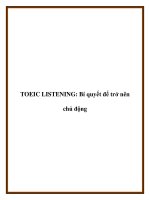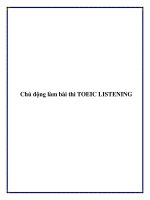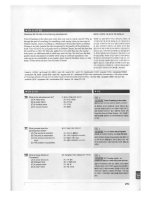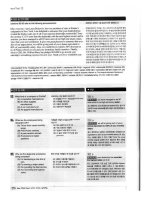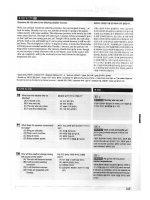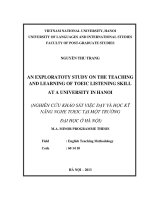TOEIC listening skill p1
Bạn đang xem bản rút gọn của tài liệu. Xem và tải ngay bản đầy đủ của tài liệu tại đây (603.39 KB, 32 trang )
PRACTICAL ENGLISH
LISTENING: Asking for tourist information
LANGUAGE SUMMARY
Asking for information 1
If you want some information about sightseeing, you can say:
I'd like to get some information about sightseeing in the city.
I was wondering if you could give me some information about sightseeing.
Could you give me some information about sightseeing?
Asking for information 2
If you want information about tickets, you can say:
Can you tell me where I can get tickets for the City Bus Tour?
Could you tell me where to get tickets for the City Bus Tour?
Do you know where I can get tickets for the City Bus Tour?
If you want a map, you can say:
Do you have a map of the area?
Could you give me a city map?
Where can I get a map of the area?
If you want directions to a place, you can say:
How do I get to the Fine Arts Museum?
Could you give me directions to the Fine Arts Museum?
Can you tell me how to get to the Fine Arts Museum?
Asking for information 3
If you want to know when a tourist site opens or closes, you can say:
Do you know what time it opens/closes?
What time does it open/close?
What are the hours?
If you want to know how much the tickets are for a tourist site, you can say:
How much are the tickets?
How much does it cost?
Could you tell me how much the tickets are?
The person you ask about ticket prices may say:
Admission is $15.
It costs $15.
The tickets are $15.
© Reallyenglish 2013
PRACTICAL ENGLISH
LISTENING: Asking for tourist information
LISTENING PRACTICE: TRANSCRIPT
Concierge: Hello. How can I help you?
Tourist: Hi. Could you give me some information about the Modern Art Museum?
Concierge: Sure. What would you like to know?
Tourist: Do you know where I can get tickets?
Concierge: You can buy the tickets at the museum.
Tourist: Oh, great. How much are they?
Concierge: They're usually $20, but if you go on Tuesday night, admission is free.
Tourist: Oh, that's nice, but I can only go today. What are the hours?
Concierge: The museum is open from 11:00 a.m. to 5:00 p.m. today.
Tourist: Okay. Can you tell me how to get there?
Concierge: The best way to get there is to take the red train line to the Museum stop.
When you get off the train, you'll see the museum right in front of you.
Tourist: Wonderful. Thank you. Oh, one more thing…
Concierge: Yes?
Tourist: Do you have a map of the area?
Concierge: Sure! Here you go.
Tourist: Thank you!
© Reallyenglish 2013
PRACTICAL ENGLISH
LISTENING: At passport control
LANGUAGE SUMMARY
At passport control 1
If you enter a country that you are visiting on vacation or on business, the immigration officer will ask
you questions. For example:
Is this your first visit to the U.S.?
Is this the first time you've been to the U.S.?
Have you been to the U.S. before?
If this is not your first time, the immigration office may ask you:
When were you last here?
When was the last time you were here?
When were you here last?
At passport control 2
The immigration officer will want to know the purpose of your visit:
What is the purpose of your visit/trip?
What is the nature of your visit/trip?
Why are you visiting the U.S.?
What brings you to the U.S.?
You can tell the immigration officer the purpose of your visit. For example:
I'm here on business.
I'm here on vacation.
I'm here for sightseeing.
I'm here to visit friends/relatives.
At passport control 3
The immigration officer will probably ask you for details about your visit. For example:
Length of stay
How long are you staying?
How long will you be here?
How long are you planning to stay?
Plans
Where do you plan to go while you are here?
Where are you going?
Where will you be going?
Accommodations
Where are you staying?
Where will you be staying?
Where do you plan to stay while you are here?
© Reallyenglish 2013
PRACTICAL ENGLISH
LISTENING: At passport control
LISTENING PRACTICE: TRANSCRIPT
Immigration officer: Passport, please…Could I have your name?
Traveler: Gina Williams.
Immigration officer: And where are you from?
Traveler: I'm from London, in the U.K.
Immigration officer: Okay. What is the purpose of your trip?
Traveler: I'm here on business and to visit friends.
Immigration officer: Is this your first visit to the U.S.?
Traveler: No, I've been here 2 other times in the past.
Immigration officer: When was your last visit?
Traveler: I was here last year.
Immigration officer: Where did you go?
Traveler: I went to New York and Washington D.C.
Immigration officer: And where do you plan to go while you are here this time?
Traveler: I'm going to New York and Boston.
Immigration officer: Where are you staying?
Traveler: In New York, I'm staying at the Grand Hotel, and in Boston, I'm staying with
some friends.
Immigration officer: How long will you be here?
Traveler: I'll be here for 2 weeks.
Immigration officer: Okay. You're all set. Enjoy your stay.
Traveler: Thank you.
© Reallyenglish 2013
PRACTICAL ENGLISH
LISTENING: Automated inquiries
VOCABULARY
make a booking
to buy tickets before you go somewhere — at a movie theater
for example
stay on the line
to wait on the telephone until someone is free to speak to you
show times
when the movie programs begin at a movie theater — 3:00 p.m.
and 6:00 p.m., for example
hash key
the # button on your telephone
star key
the * button on your telephone
ticket prices
the cost of a ticket
directions
instructions that tell you how to get to a place
customer advisor
someone who gives help and information to customers
show
to let someone see something
pick up
to collect something — your tickets at the movie theater,
for example
© Reallyenglish 2013
PRACTICAL ENGLISH
LISTENING: Automated inquiries
LISTENING PRACTICE: TRANSCRIPT
Recorded Message:
Welcome to the Metro Cinemas. Please say the name of the Metro Cinemas theater
you would like information about.
Speaker:
Metro Cinemas Eastgate.
Recorded Message:
Thank you and welcome to the Metro Cinemas Eastgate.
To listen to show times or to make a booking, please stay on the line.
For more general inquiries, please call the movie theater.
If you have a touch tone phone, please press the hash key now.
Thank you.
Please press the star key on your phone twice now.
Thank you.
To listen to show times, please press 1.
To make a booking, please press 2.
For ticket prices, please press 3.
For directions to Metro Cinemas Eastgate, please press 4.
All our customer advisors are busy at the moment. Please wait for a customer advisor
to take your booking. We will answer your call in approximately 3 minutes.
Please have your credit card ready and bring it with you to the theater. You will need
to show your credit card when you collect your tickets at the theater.
© Reallyenglish 2013
PRACTICAL ENGLISH
LISTENING: Enjoying the weekend
VOCABULARY
play an
instrument
to play something musical like a guitar
stay in shape
to exercise and eat correctly to keep your body fit and healthy
visit the country
to visit places outside the city where there are fields, forests,
mountains
gamble
to put money on a game or competition — you can win or lose
enjoy yourself
to spend time doing something you like and having fun
relax
to spend time that makes you feel calm and not stressed
go for a walk
to go out walking for a short time
watch a movie
to see a film at the cinema or on TV
go to a fair
to go to an event where you can ride machines for amusement
and play games to win prizes
eat out
to go out to a public place to eat
LISTENING PRACTICE: TRANSCRIPT
You know, I work hard all week, but on the weekend, I want to enjoy myself. Saturday
morning after breakfast, I go for a walk in the country with the dog. It's a good way
for me to relax and stay in shape.
I don't like shopping, but I do go to the bookstore and get something to read. My
daughter plays the violin on the weekends. She makes a terrible noise, so I go to a
coffee shop and read. I'm also crazy about movies and theater. My wife and I often
go to the theater. We don't usually buy tickets because she works at a magazine and
she gets a lot of free tickets.
I do have one bad habit, though. I like going to horse races to gamble. I only gamble
a few dollars but, win or lose, I always enjoy myself.
© Reallyenglish 2013
PRACTICAL ENGLISH
LISTENING: Inquiring about a job
LANGUAGE SUMMARY
Inquiring about a job 1
If you call or write about a job that you are interested in, you can start by saying:
I'm calling about the job opening on your website.
I'm writing to inquire about the position you advertised.
Inquiring about a job 2
If you want to know if the job is still available, you can say:
I was wondering if the position is still open.
Do you know if the position is still open?
Has the position been filled?
Inquiring about a job 3
If you call or write about a job, you may want to ask for some details. For example:
Full-time, Part-time, Permanent, Temporary
Is the position full-time/part-time?
Is it a full-time/part-time position?
Could you tell me if the position is full- or part-time?
Is the position permanent or temporary?
Benefits
Are there medical benefits?
Could you tell me if there are medical benefits?
Does the position include health insurance?
Vacation leave, Sick leave
Is there paid vacation time/paid sick leave?
Could you tell me if there is paid vacation leave/paid sick leave?
Inquiring about a job 4
If you want to know who or where to send your resume to, you can say:
Who do I send my resume to?
Could you tell me where to send my resume?
© Reallyenglish 2013
PRACTICAL ENGLISH
LISTENING: Inquiring about a job
LISTENING PRACTICE: TRANSCRIPT
Receptionist: Thank you for calling Perry's Books. Can I help you?
Caller: Yes, I'm calling about the job opening on your website.
Receptionist: The sales manager position? Yes. What can I tell you about it?
Caller: Has the position been filled?
Receptionist: No, it hasn't, but they're starting to do interviews, so you should
apply soon.
Caller: OK. Is it a full-time position?
Receptionist: Yes, 40 hours a week.
Caller: And is the position permanent?
Receptionist: No, actually, it's a temporary position, but it could become permanent.
Caller: OK. Does the position include health insurance?
Receptionist: Yes, it does. And there are also dental benefits.
Caller: Great. Is there paid sick time?
Receptionist: Yes, there is. We get 10 paid sick days each year. We also get 10 paid
vacation days each year.
Caller: Wonderful. Could you tell me where to send my resume?
Receptionist: Actually, you can apply right on our website. Just click on the link that
says, "Apply here".
Caller: Thank you very much!
Receptionist: You're welcome. Good luck!
© Reallyenglish 2013
PRACTICAL ENGLISH
LISTENING: Ordering a meal in a restaurant
LANGUAGE SUMMARY
Ordering in a restaurant 1
If you are ordering a drink in a restaurant, you can say:
I'll have a large/small orange juice/coffee/cola.
I'd like a large/small orange juice, please.
Could I have a large/small orange juice?
If you want to see the drinks menu, you can say:
Could I see the drinks menu?
May I see the drinks menu?
Do you have a drinks menu?
Ordering in a restaurant 2
If you want to know what the soup of the day is, you can say:
What's the soup of the day?
What's the soup today?
What kind of soup do you have today?
If you want to know what the specials are, you can say:
Could you tell me what the specials are tonight?
Are there any specials tonight?
What are your specials tonight?
If you want something extra to go with your meal, you can say:
Could I have a side of steamed/fried rice with that?
I'll take a side of steamed/fried rice.
I'll have steamed/fried rice on the side.
Could I have a salad with that?
I'll have a salad with that.
I'll take a salad with that.
Ordering in a restaurant 3
Here are some questions that a server may ask you about your order:
Would you like an appetizer/a salad/a dessert/some coffee?
And for your entrée?
What would you like for your main dish?
Would you like a drink?
Would you like anything else?
Ordering in a restaurant 4
When you want to pay the check, you can say:
We'll just take the check/bill.
Could we please have the check/bill?
Can you bring the check/bill, please?
© Reallyenglish 2013
PRACTICAL ENGLISH
LISTENING: Ordering a meal in a restaurant
LISTENING PRACTICE: TRANSCRIPT
Server: Hi. How are you today?
Customer: Fine, thanks. And you?
Server: I'm doing great, thanks! Can I get you something to drink?
Customer: I think I'll just have a glass of water for now.
Server: Okay. I'll be right back with that.
Customer: Thanks.
[Server returns with glass of water]
Server: Here you go. Are you ready to order?
Customer: Actually, I need another minute. Let's see…Are there any specials this
evening?
Server: Yes, we have baked chicken with broccoli and potatoes, and we also have a
fried fish plate. That comes with salad and French fries.
Customer: And what kind of soup do you have tonight?
Server: Let's see…The soup of the day is tomato.
Customer: Hmm…That sounds good. I think I'll have a bowl of soup as an appetizer,
and for my entrée, I'll have the fried fish plate.
Server: Okay. Can I get you anything else?
Customer: No, that's it. Oh…Actually, what kind of tea do you have?
Server: We have black tea and herbal tea.
Customer: I'll have the herbal tea.
Server: Okay. I'll be right back with that.
Customer: Thank you.
© Reallyenglish 2013
PRACTICAL ENGLISH
LISTENING: Arranging a business trip
LANGUAGE SUMMARY
Making arrangements 1
If you want someone to help you make arrangements for a business trip, you can say:
I need to make arrangements for a business trip to New York.
Could you help me arrange a business trip to New York?
Making arrangements 2
When you are specifying your dates and activities for an upcoming business trip, you can say:
I need to be there on November 2nd, 3rd, and 4th.
I have meetings on November 2nd, 3rd, and 4th.
I'm attending a conference from November 2nd to the 4th.
Making arrangements 3
If you want someone to make flight arrangements for you, you can say:
Could you get me a flight out on the afternoon of the 18th?
Could you book me a flight on the afternoon of the 18th?
I'd like to fly out in the morning.
I'd prefer a morning flight.
Making arrangements 4
If you want someone to make a reservation for you at a hotel, you can say:
Could you make a reservation for me at the Hartford Hotel?
Could you reserve a room for me at the Hartford Hotel?
© Reallyenglish 2013
PRACTICAL ENGLISH
LISTENING: Arranging a business trip
LISTENING PRACTICE: TRANSCRIPT
Bob: Hi, Susan. How are you this morning?
Susan: Fine, thank you, Bob. I need to make arrangements for a business trip to
Osaka.
Bob: Okay. I can help you with that. When are you going?
Susan: Let's see…I have meetings on August 8th and 9th.
Bob: All right. So, would you like to leave on the 7th and return on the 10th?
Susan: Hmm. Actually, could you book me a return flight on the evening of the 9th?
I have a meeting back here on the morning of the 10th.
Bob: Sure. And what time would you like to fly out on the 7th?
Susan: Let's see…I'd prefer an afternoon flight.
Bob: Sure. No problem.
Susan: Also, could you make a reservation for me at the Plaza Hotel?
Bob: Sure. I'll make it for the nights of the 7th and the 8th.
Susan: Great.
Bob: Anything else? Do you need a rental car or any restaurant reservations?
Susan: No, I think that's it.
Bob: Okay. I'll arrange it and get back to you with the reservation information.
Susan: Great. Thank you for your help.
Bob: You're welcome.
© Reallyenglish 2013
PRACTICAL ENGLISH
LISTENING: Asking for and giving recommendations
LANGUAGE SUMMARY
Asking for a recommendation
If you are looking for a good place to get something to eat, you can ask:
Can you recommend a good place to get something to eat?
Can you suggest someplace to eat nearby/around here/in this neighborhood?
Do you know any good restaurants nearby?
Giving a recommendation 1
If you ask someone to recommend a place to eat, the person may ask you:
What kind of place/food are you looking for?
What type of place/food are you looking for?
What kind of food do you like?
What kind of food are you interested in?
Giving a recommendation 2
If you are recommending a place to eat, you can say:
I recommend Salty's Seafood on Oak Street.
You should try Salty's Seafood on Oak Street.
How about Salty's Seafood on Oak Street?
If you want to mention something that is good about the place, you can say:
The menu/atmosphere is excellent.
They have an excellent menu.
If you want to recommend a dish, you can say:
You should try the fruit and cheese plate.
Be sure to try the fruit and cheese plate.
© Reallyenglish 2013
PRACTICAL ENGLISH
LISTENING: Asking for and giving recommendations
LISTENING PRACTICE: TRANSCRIPT
Woman:
Excuse me. Can you recommend a good place to get lunch around here?
Man:
Sure. There are lots of good places nearby. What type of place are you looking for?
Woman:
Well, we like Asian food a lot.
Man:
I recommend Yoko's Sushi Bar. It's right over there on Main Street. They have
delicious appetizers. You should try the ginger ice cream for dessert…Oh, and be
sure to get a seat outside so you can watch the people walk by.
Woman:
That sounds great, but is it fast? We're late. We only have about 20 minutes for lunch.
Man:
Oh. That won't work then. It's a sit-down restaurant. Let's see…There's also a great
Vietnamese place right down the street. They have excellent spring rolls.
Woman:
That sounds delicious.
Man:
It is, and it's fast, too. You buy your food at the counter, and then sit in the small
dining area.
Woman:
Great…We'll go there! Thank you!
Man:
You're welcome. Enjoy your lunch!
© Reallyenglish 2013
PRACTICAL ENGLISH
LISTENING: Checking in at your hotel
LANGUAGE SUMMARY
Checking in at your hotel 1
If you are checking in at a hotel and you have a reservation, you can say:
I'm checking in.
I'd like to check in, please.
I need to check in.
The hotel clerk at the front desk will ask for your name:
What name is the reservation under?
Is the reservation under your name?
May I have your name, please?
The hotel clerk may want to know when you are checking out. For example:
When will you be checking out?
How long will you be staying?
Checking in at your hotel 2
If you want a specific kind of room, you can say:
Could I have a non-smoking room/suite/room with two beds, please?
Would it be possible to get a non-smoking room?
If possible, I'd like a non-smoking room.
The hotel clerk will ask you if you need help with your bags. For example:
Do you need help with your bags?
Can we help you with your baggage?
Would you like some help with your bags?
Checking in at your hotel 3
If you want to know where something is in the hotel, you can say:
Can you tell me where the business center/fitness center/restaurant/pool is?
Can you direct me to the business center/fitness center/restaurant/pool?
Could you tell me where the business center/fitness center/restaurant/pool is located?
© Reallyenglish 2013
PRACTICAL ENGLISH
LISTENING: Checking in at your hotel
LISTENING PRACTICE: TRANSCRIPT
Hotel clerk: Next, please…Can I help you?
Mr. Richards: Yes, I'm checking in.
Hotel clerk: Okay. I can help you with that. What name is the reservation under?
Mr. Richards: Richards — Mark Richards.
Hotel clerk: Yes, Mr. Richards. I see you'll be staying with us for 4 nights and checking
out on Friday?
Mr. Richards: Yes, that's right.
Hotel clerk: I have you in a non-smoking room with one bed.
Mr. Richards: Actually, would it be possible to get a room with 2 beds?
Hotel clerk: Let's see…I have a suite with 2 beds available. That would be $30 more
per night.
Mr. Richards: Okay, that will be fine.
Hotel clerk: Great…Okay, Mr. Richards. You'll be in room 408. Just take the elevator
to the 4th floor, and then turn right.
Mr. Richards: Also, can you tell me where the business center is?
Hotel clerk: Sure. Go through the lobby towards the front door, and you'll see it on
your right.
Mr. Richards: Thanks. Oh, and how about the fitness center?
Hotel clerk: It's on the 8th floor.
Mr. Richards: Great. Thank you very much.
Hotel clerk: You're welcome. Enjoy your stay.
© Reallyenglish 2013
PRACTICAL ENGLISH
LISTENING: Checking in for a flight
LANGUAGE SUMMARY
Checking in for a flight 1
If you are checking in for a flight, you can say:
I'm checking in.
I need to check in.
I'd like to check in.
The ticket agent will ask to see some I.D. on an internal flight in the U.S. or your passport
on an international flight:
I just need to see some I.D./your passport, please.
May I see some I.D./your passport, please?
Checking in for a flight 2
The ticket agent will ask you if you are checking any bags:
Are you checking any bags?
Do you have any bags to check?
If you are traveling on an internal flight in the U.S., you have to pay a fee for checked bags:
There's a $15 fee for one checked bag.
The charge for one checked bag is $15.
The ticket agent may ask you if you have a lock on your bag:
Do you have a lock on your bag?
Is there a lock on your bag?
Is your bag locked?
Checking in for a flight 3
The ticket agent may tell you to take your bag to be checked by security:
Please take it to the security check.
Please give it to the security agent.
When you have checked in, the ticket agent will give you your boarding pass, gate number, and
boarding time:
Here's your boarding pass. Your flight leaves from gate 22B and boards at 10:30.
This is your boarding pass. You leave from gate 22B. Boarding begins at 10:30.
© Reallyenglish 2013
PRACTICAL ENGLISH
LISTENING: Checking in for a flight
LISTENING PRACTICE: TRANSCRIPT
Ticket agent: Yes, sir. Can I help you?
Mr. Kennedy: Yes, I need to check in.
Ticket agent: Sure. I just need to see your I.D., please.
Mr. Kennedy: Here you go.
Ticket agent: Thank you, Mr. Kennedy. Let's see…You're on flight 779 to Los Angeles
and then connecting to flight 11 to Tokyo.
Mr. Kennedy: Yes, that's right.
Ticket agent: It looks like both flights are on time.
Mr. Kennedy: Oh, that's great.
Ticket agent: Are you checking any bags?
Mr. Kennedy: Yes. I have one bag. How much is it?
Ticket agent: Oh, there's no charge for checked bags on international flights.
Mr. Kennedy: Great. Thanks.
Ticket agent: Is there a lock on your bag?
Mr. Kennedy: No, there isn't.
Ticket agent: Okay. Your flight leaves from gate 11A, and boarding will begin at 6:10.
Here are your boarding passes.
Mr. Kennedy: Thank you.
Ticket agent: Please take your bags over there for the security check. Have a nice trip!
Mr. Kennedy: Thank you.
Ticket agent: You're welcome.
© Reallyenglish 2013
PRACTICAL ENGLISH
LISTENING: Planning to go out
VOCABULARY
get together
to meet socially — a different way of saying 'meet up'
as usual
in a way that has often happened before
busy
the opposite of 'free'
free
not busy — you are available to do something
meet up
to meet socially — a different way of saying 'get together'
What about
(going out?)
you use 'What about' when you want to suggest something
can't make
not free to go somewhere or do something
Why not (go to
the park?)
you use 'Why not' when you want to suggest something
go out for
you use this when you talk about going somewhere to do
something particular — have a meal at a restaurant, for example
great
you say this to show you are happy with an arrangement you
have just made
© Reallyenglish 2013
PRACTICAL ENGLISH
LISTENING: Planning to go out
LISTENING PRACTICE: TRANSCRIPT
Karen: Hi, Paul! It's Karen.
Paul: Hello, Karen. Nice to talk to you. How are you?
Karen: I'm very busy, as usual. How about you?
Paul: Well. But busy, too.
Karen: Listen. We must get together soon. I want to hear all about your new
girlfriend, and show you my holiday photographs.
Paul: I'd love to meet up. When are you free?
Karen: What about this Tuesday, after work?
Paul: Tuesday evenings I have my art class. But I have time on Wednesday…
Karen: I can't make Wednesday. I'm going out for dinner with Mark. What about
Thursday, then?
Paul: No, I'm sorry, I have to work Thursday night. We are preparing for an international
marketing convention. It's in Shanghai, next month. I'm free on Friday, though.
Karen: Sorry, I'm meeting Jane and Laura after work for a drink — but why not come
too? Then we can go back to my apartment afterwards.
Paul: That would be great! Where? What time?
Karen: What about 7:30 at the Golden Frog?
Paul: Cool! I'll see you then! I have to run now. Bye!
Karen: Bye! See you Friday.
© Reallyenglish 2013
PRACTICAL ENGLISH
LISTENING: Requesting information
LANGUAGE SUMMARY
Requesting information 1
If you are calling someone to get information about something, you can say:
I'm calling about your sale on business cards.
I'm calling because I'm interested in your business cards.
I'm calling because I'm interested in learning more about your business cards.
Note:
1.You use the preposition in after be interested.
2.You use the -ing form if you use a verb-form after be interested.
Requesting information 2
If you want to get more information about a product (or a service) you can say:
I'm interested in getting more information about your mp3 players.
I'd like to get more information about your mp3 players.
I'd like to find out more about your mp3 players.
Note:
1.You use the preposition in after be interested.
2.You use the -ing form if you use a verb-form after be interested.
Requesting information 3
If you want a company to send you some information, you can say:
Can you send me a list of your sale prices?
Could you send me a list of your sale prices?
Is there any way you could send me a list of your sale prices?
Note:
Could you…? is more formal than Can you…?
© Reallyenglish 2013
PRACTICAL ENGLISH
LISTENING: Requesting information
LISTENING PRACTICE
Salesperson:
Hi. Thank you for calling Computer World. Can I help you?
Customer:
Hi. Yes, thank you. I'm calling about your computers.
Salesperson:
Yes. How can I help you?
Customer:
I'm interested in getting more information about the JP 460 computer.
Salesperson:
Sure. What can I tell you about it?
Customer:
Well, I need to get 10 computers for my office and we think this might be the right
one for us.
Salesperson:
Great. Actually, it's on sale right now for only $799.
Customer:
Oh really? That's wonderful. Does that price include the software?
Salesperson:
No, unfortunately the software is extra, but it does include the monitor, keyboard,
and mouse.
Customer:
Does it come with a flat-screen monitor?
Salesperson:
No, but you can exchange the regular monitor for a flat-screen monitor for only $50
more per computer.
Customer:
Great. Can you send me a confirmation email that says what it comes with?
Salesperson:
Sure. Just hold on one minute and I'll take your name and email address.
© Reallyenglish 2013
PRACTICAL ENGLISH
LISTENING: Making appointments
LANGUAGE SUMMARY
Making appointments 1
If you are calling to make an appointment, you can say:
I'd like to make an appointment with Ms. Avila.
I'd like to schedule an appointment with Ms. Avila.
Note:
You make or schedule an appointment with someone.
Making appointments 2
If you are making an appointment for someone, you usually ask what the appointment is for:
May I ask what it's regarding?
Could I ask what it's regarding?
Could I ask what the appointment is for?
Making appointments 3
If you want to make it clear when the next appointment times are available, you can say:
We're looking at the week of the 17th for appointments.
We are scheduling into the week of the 17th.
If you want to suggest a specific date and time for the appointment, you can say:
We could do it on the 18th at 2:00 p.m.
She has an opening on the 18th at 2:00 p.m.
She can take you on the 18th at 2:00 p.m.
Making appointments 4
You can finish the conversation by saying:
We'll see you then!
See you on the 20th at 10 o'clock.
© Reallyenglish 2013
PRACTICAL ENGLISH
LISTENING: Making appointments
LISTENING PRACTICE
David:
Hello?
Bob:
Hello, could I please speak to David Sims?
David:
Yes, this is David.
Bob:
Hi, David, this is Bob Kazuo, the sales manager at KGG Chemicals.
David:
Yes, hi Bob.
Bob:
I'm calling because we received your resume for the sales position. It looks like you
have a lot of interesting experience and we'd like to schedule an interview with you.
David:
Great. Thanks. I'd like that.
Bob:
Let's see, we're looking at the week of the 19th for interviews.
David:
Okay.
Bob:
Let's see…we could do it on the 19th at 1 or 3 in the afternoon, or the 20th at 10 in
the morning. Would any of those times work for you?
David:
Let's see. Sure. How about the 20th at 10 o'clock?
Bob:
Okay, great. We'll see you on the 20th at 10 a.m.
David:
I'm looking forward to it. Thanks for the opportunity.
© Reallyenglish 2013

